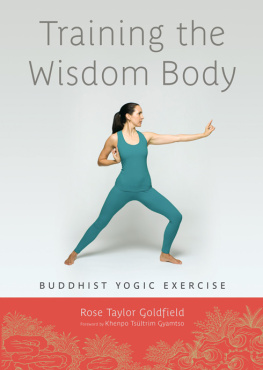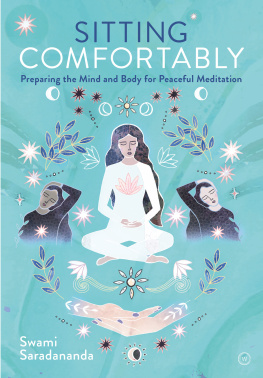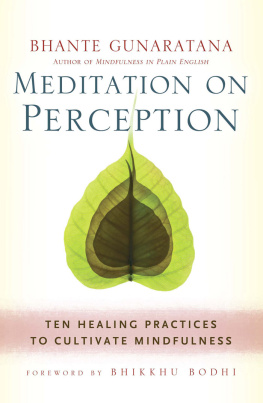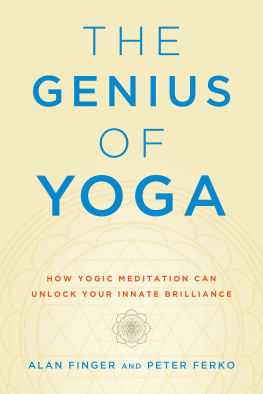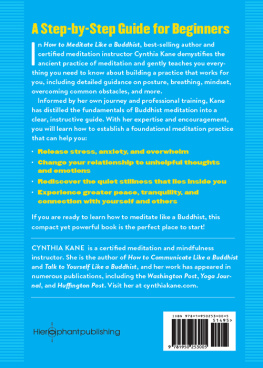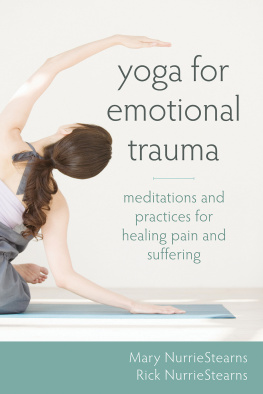Anyone interested in the internal path of yoga or Buddhism knows that as you work with the body you cant help but work with emotional and mental holding patterns as well. Rose Taylor Goldfields new book integrates the psychological aspects of practice with practical advice about staying grounded in your body. For meditators this book will help root the mind in the body, and for people familiar with physical yoga, this book will help you work with the mental chatter, old emotional patterns, and distractions that inevitably arise as you go deeper. I wish I had read this book when I started on this path.
Michael Stone, author of The Inner Tradition of Yoga
Drawing from her in-depth immersion in Tibetan Buddhism, Rose Taylor Goldfield offers an accessible, comprehensive guide to yogic interconnection of the body, breath, and mind in a way that renders these ancient methods applicable to anyone, whether Buddhist or not.
Sarah Powers, author of Insight Yoga
Rose Taylor Goldfield opens up words and ideas to shed new light on the practice of traditional Buddhist yoga. This is a clear, thoughtful, and practical book that reflects years of study and practice. It is a unique guide for anyone wanting, as Rose writes, to look into their own being to fully understand themselves.
Elizabeth Mattis-Namgel, author of The Power of an Open Question
ABOUT THE BOOK
Sitting still in meditation may be the common image that comes to mind when one thinks of Buddhist practicebut just as important is cultivation of awareness through movement. The traditional Tibetan practice of yogic exercises known as lujong helps us connect with and explore the natural wisdom inherent in our living, breathing, feeling bodies. Lujong is an exercise that engages our whole beingbody, mind, and subtle bodyfrom the coarse aspects to the subtler and more profound. This book provides a thorough foundation for those new to the practice, and it helps people already engaged in any form of yogic exercise to deepen the potent fusion of meditation and physical movement. Included is an overview of the unique tradition of Buddhist yoga, along with instructions on how to work with the body and mind in seated meditation; tips for furthering our practice by working with adversities such as fear, procrastination, and anxiety; and guidance on bringing practice mind into daily life. The author also offers exercise instructions and a complete explanation of the movement practices, with photos to illustrate.
ROSE TAYLOR GOLDFIELD is a second-generation Buddhist teacher of meditation, philosophy, and yogic exercise and dance. She holds an MA in Indo-Tibetan Buddhist studies from Naropa University. Having studied and practiced extensively in the Shambhala lineage, she began training in 2002 under the close guidance of the Tibetan master Khenpo Tsltrim Gyamtso, who appointed her teacher to his nuns in Bhutan and Nepal in 2005. Since childhood, she has trained extensively in a variety of physical disciplines, including classical ballet, competitive kickboxing, Nepalese dance, and Indian and Tibetan yoga. Rose lives in San Francisco and teaches under the auspices of the Wisdom Sun practice and study community.
Sign up to learn more about our books and receive special offers from Shambhala Publications.

Or visit us online to sign up at shambhala.com/eshambhala.
TRAINING THE WISDOM BODY

BUDDHIST YOGIC EXERCISE
Rose Taylor Goldfield

SHAMBHALA
BOSTON & LONDON
2013
Shambhala Publications, Inc.
Horticultural Hall
300 Massachusetts Avenue
Boston, Massachusetts 02115
www.shambhala.com
2013 by Rose Taylor Goldfield
Cover design by Kathleen Lynch / Black Kat Design
Cover photograph Claudine Gossett; cover illustration by Robert Beer
All rights reserved. No part of this book may be reproduced in any form or by any means, electronic or mechanical, including photocopying, recording, or by any information storage and retrieval system, without permission in writing from the publisher.
Library of Congress Cataloging-in-Publication Data
Goldfield, Rose Taylor.
Training the wisdom body: Buddhist yogic exercise / Rose Taylor Goldfield.First edition
pages cm
eISBN 978-0-8348-2899-5
ISBN 978-1-61180-018-0 (pbk.)
1. Yoga. 2. MeditationBuddhism. I. Title.
RA781.67.G65 2013
613.7046dc23
2012050840
CONTENTS
Ha ha ha! Hee hee hee! Ho ho ho!
When you practice yogic exercise,
Know your body is not solidly real
It is appearance-emptiness.
Your body is like a dream body.
When you practice yogic exercise,
Know sounds are not solidly real
They are sound-emptiness.
Sounds are like echoes in a valley.
When you practice yogic exercise,
Let mind rest relaxed within itself.
All that appears in your mind is naturally liberated.
Ha ha ha! Hee hee hee! Ho ho ho!
KHENPO TSLTRIM GYAMTSO RINPOCHE
February 2012
Tek Chok Ling Nunnery, Kathmandu, Nepal
I T TOOK MANY people to transform this book from a vision to a reality, and I am grateful to everyone who helped in the process.
In particular, my heartfelt appreciation goes out to the following people who have been profound influences in my life and from whom I receive so much strength and support. To Bridget Taylormy motherfor my life, for all she has taught me, and for introducing me to buddhadharma. We were together when we had the great good fortune to meet Khenpo Tsltrim Gyamtso Rinpoche (who would become my heart teacher) and his translator and secretary, Ari Goldfield (who would become my heart companion). To Aria wonderfully gifted teacher and my beloved husbandwho holds me to a higher vision of myself and who brings learning, light, and laughter to our daily life together. I am so thankful to Khenpo Rinpoche for the opportunity to be his student; to work for him; to live with him; and to share the crazy, joyful, unsettling, dreamlike world that he inhabits, one that reverberates with song. I would also like to express my endless gratitude to Chgyam Trungpa Rinpoche for the extraordinary wealth of Dharma teachings that he has left to the world and to which I continually turn for succor, inspiration, and humor.
When I was studying Tibetan, it was hard to find people with the skill, time, and generosity to develop my studies further. I would like to express my sincere gratitude to those who helped me on that roadin particular, Lama Chnam, Jules Levinson, and Chryssoula Zerbini.
Now to the many people who worked specifically on this book, every one of whom I would be delighted to work with again (I feel so fortunate in being able to say that). Aris help was invaluable throughout the entire processplanning, forming, and editing the book, as well as maintaining my sanity (or something resembling it). Heartfelt gratitude to Sara Bercholz for her skillful editing, which added a lot to the book, and for her friendship and support; also to the entire Shambhala Publications staffit was wonderful to work with them again. I was far from looking forward to the photo shoot, expecting it to be rather excruciating, but it turned out to be a fun day under the kind professional care of expert photographer Claudine Gosset and the two lovely ladies who assisted me, Lisa Jacobs and Deb Wolfe. Lama Palden and Sukhasiddhi Foundation generously offered their space for the shoot. Many thanks to Chelsea Points for doing such a wonderful job on the illustrations and to Jeff Wigman for the excellent spine illustration. I am very grateful to two dear friends: Emily Bower, for her adept advice, and Annelies Smith, for her insightful reading of the draft manuscript. The snazzy outfit is courtesy of Beyond Yoga.
Next page
